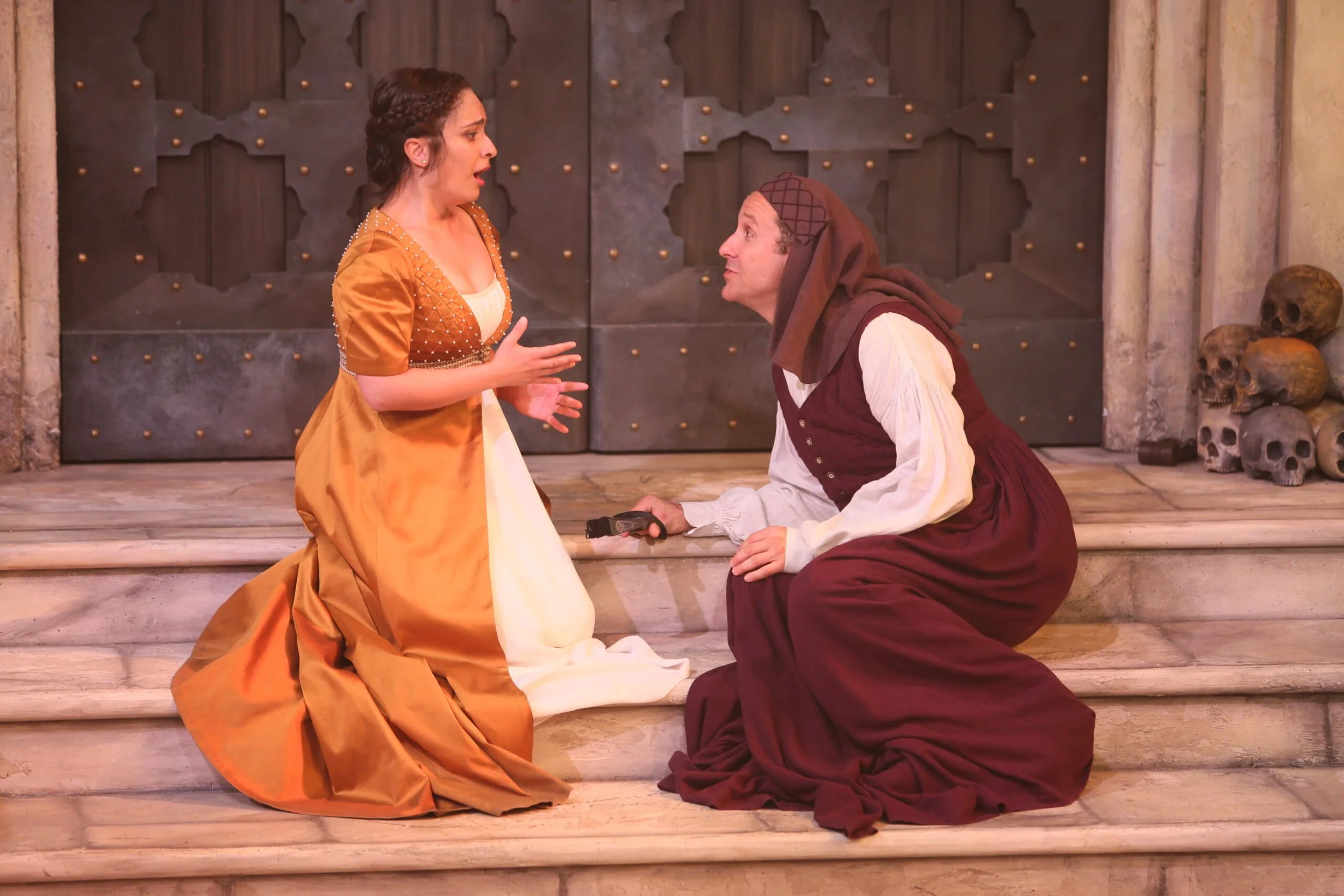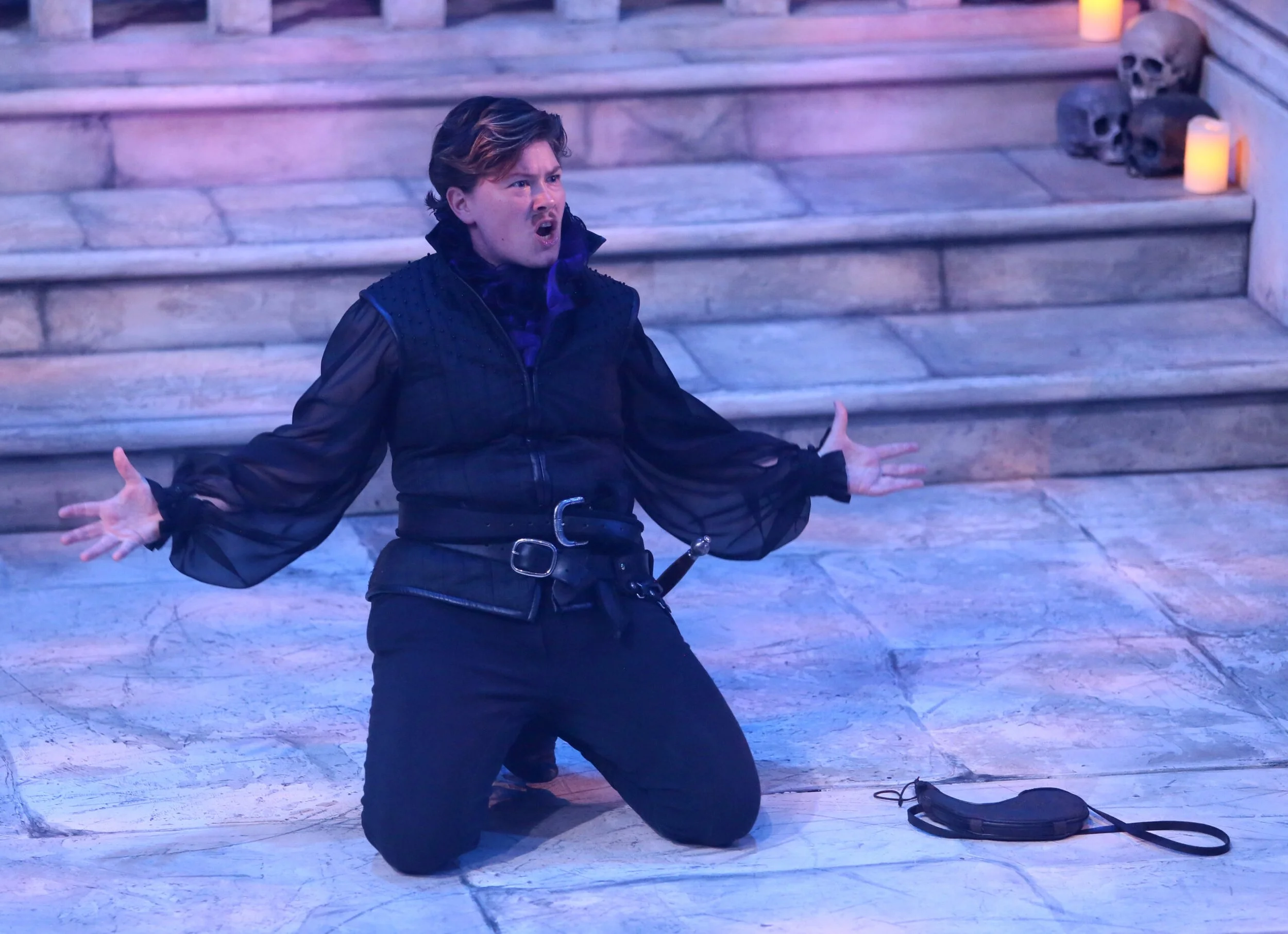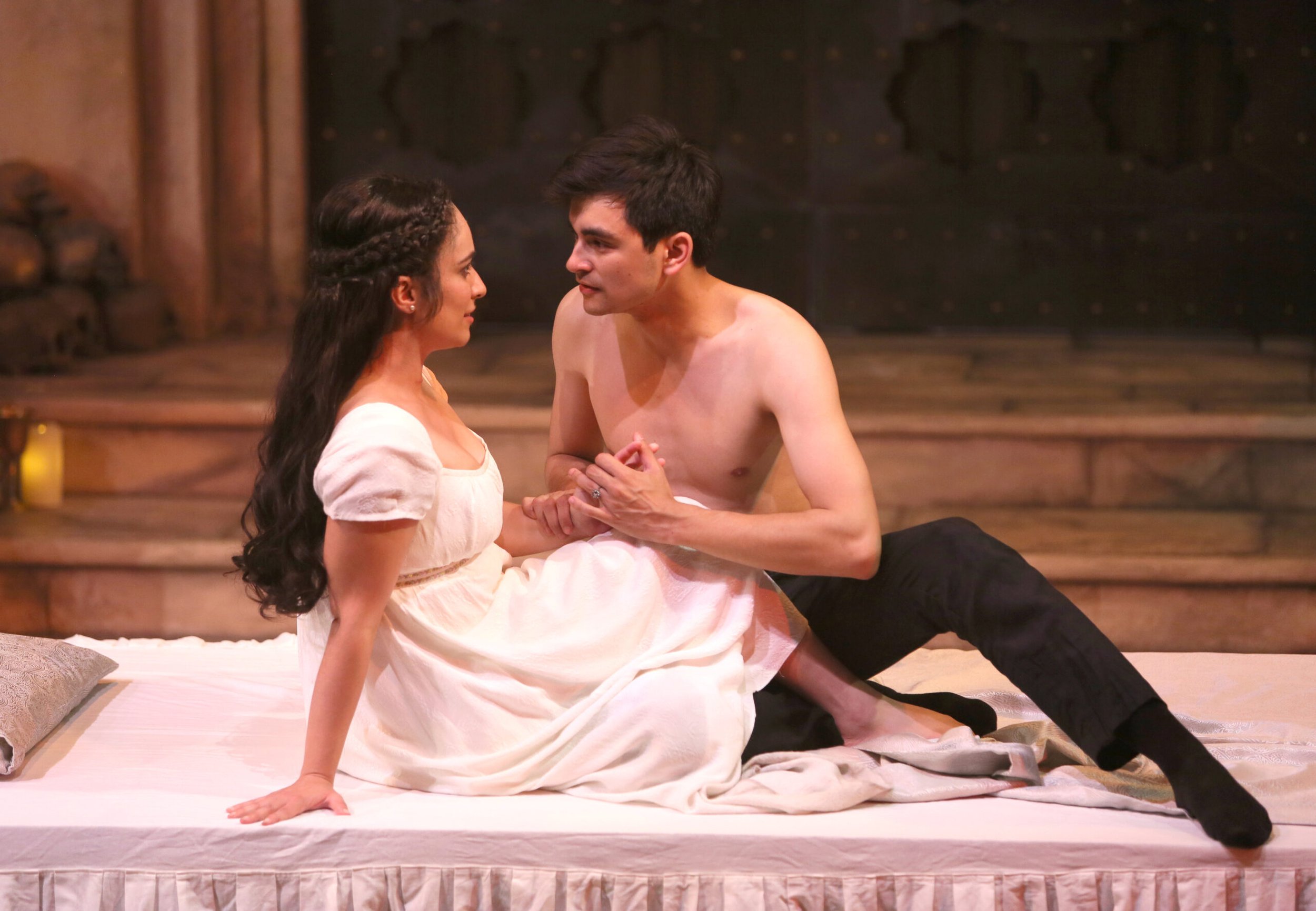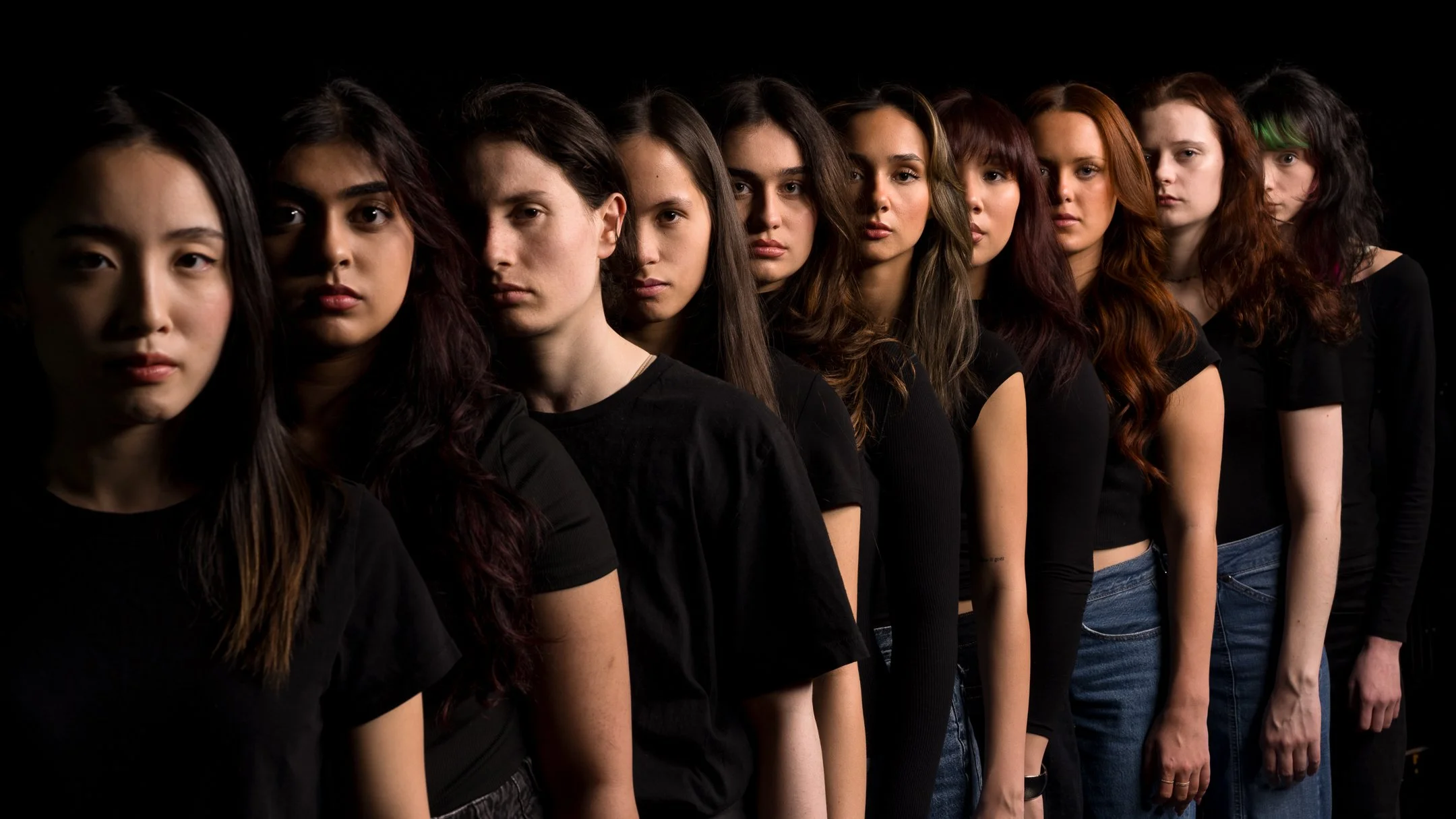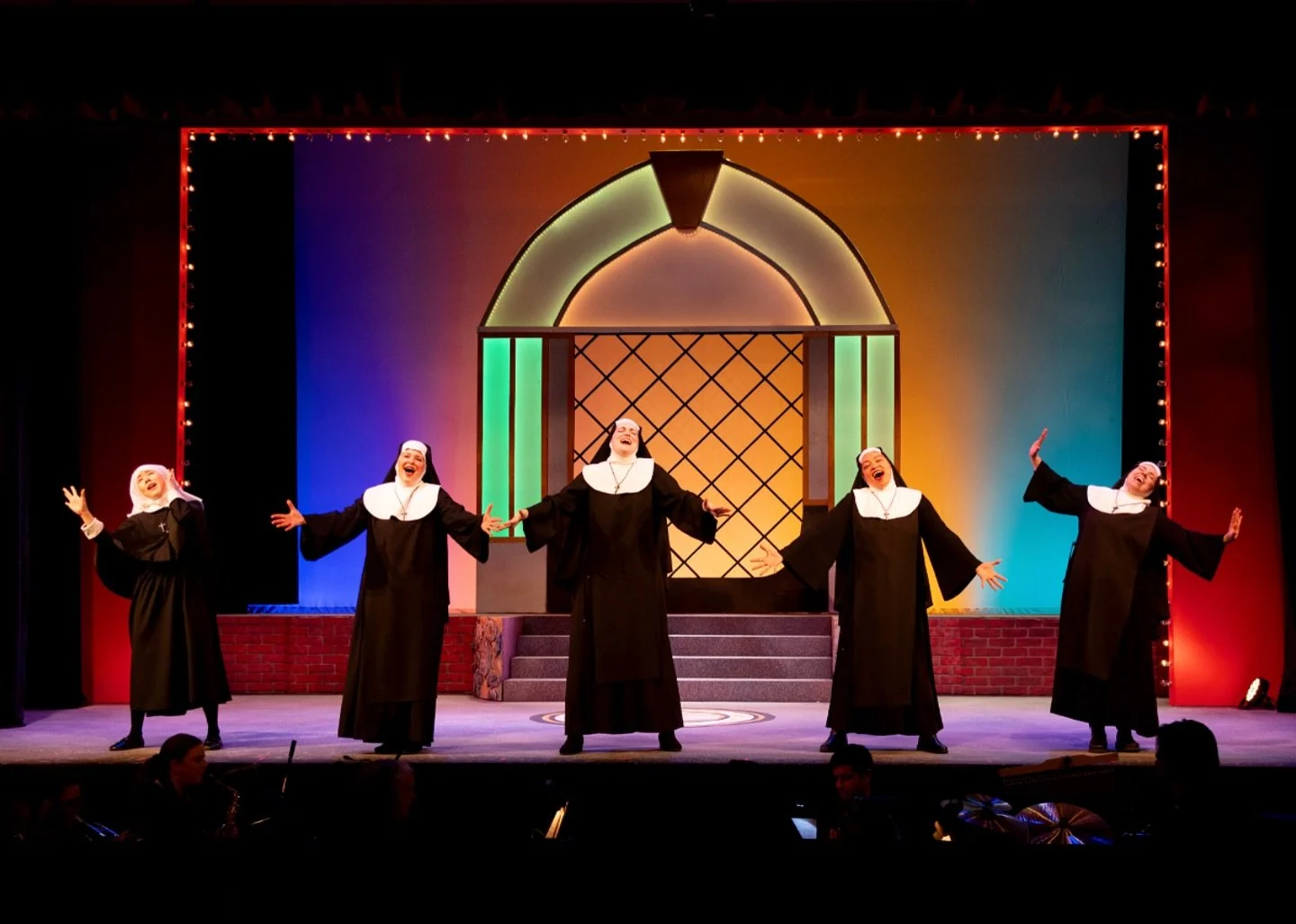Theatre review: Romeo and Juliet leans into comedy over tragedy at Bard on the Beach
New production begins at the end, and puts a farcical new spin on the Nurse
Ghazal Azarbad and Andrew McNee in Romeo and Juliet. Photo by Tim Matheson
Bard on the Beach Shakespearean Festival presents Romeo and Juliet at the Howard Family Stage to September 24
ROMEO AND JULIET has never been thought of as a traditional Shakespearean tragedy. Though it ends horribly for its two star-crossed lovers, it has many witty moments and even plays with comedic conventions in its early acts.
But Bard on the Beach’s new production leans far more heavily on the comedy than likely any other production audiences have seen (save maybe for cartoon parodies like The Family Guy’s). In fact, in several scenes, it feels closer to farce.
Tightening the script and cutting a few extraneous characters, then chronologically rearranging the show into a flashback, director Anita Rochon’s rendition ends up being accessible and entertaining, with an empowered Juliet. But that comes at the expense of Shakespeare’s subtler details and psychological nuances—key strengths in a work where the delicate wordplay includes such elegant lyrical riddles as “my lips, like two shy and blushing pilgrim travellers, to smooth over the rough touch of my hand upon yours by kissing your hand”.
So, for Shakespeare die-hards, and hopeless romantics who have come for the exquisite pain of doomed love, the tone might feel odd. For newcomers, like the teen in stitches in the front row on opening night, this production may come as an enjoyable surprise.
The bulk of the humour arrives care of the Nurse, given a gender-bending spin on the fussbudget role by actor Andrew McNee. (He’s one of several Bard veterans playfully switching up parts; he last took up the role of Mercutio in the tent, while Jennifer Lines, here tackling Lady Capulet, has previously played the Nurse, and Juliet before that.) A master of physical comedy and the sarcastic double take, McNee plays the role less as drag, and more like a guy—or one of Shakespeare’s male clowns—in a wimple. It’s a gutsy casting choice.
His comic relief comes not just in the lighter first half of the script, when he brings cartoonish new meaning to “I am so vexed, that every part about me quivers!”, or when he takes a dramatic breather to maniacally fan himself when he rushes to Juliet with a message. It also comes incongruously in the second: the Nurse’s discovery of Juliet’s (faked) dead body in bed is preceded by a brief conniption that the girl has gone to sleep fully clothed.
But the Nurse isn’t the only one who plays things for laughs. During the hallowed balcony scene, Ghazal Azarbad’s Juliet takes a slapstick dive onto the floor when she realizes she’s being watched by Romeo (Daniel Fong). And she’s always losing patience with her “Nu-u-u-rse!”. The weirdest moment? When Ishan Sandhu’s Prince grinningly asks the whereabouts of his bride, not realizing she’s lying pulse-less in the next room—sending laughter rippling through the audience.
Sara Vickruck as Mercutio in Romeo and Juliet. Photo by Tim Matheson
But let’s back up for a minute. Arguably Rochon’s boldest change is the play’s opening—and it’s instantly effective. The cast members gather in a skull-lined crypt, take their places, and then Juliet awakens, with one huge gasp, from her potion’s deep sleep to find Romeo dead beside her. (It’s a scene we will circle back to at the end.) Throughout, Juliet watches from the background, in an almost dreamlike state, as the events that led to the disaster unfold chronologically from the beginning. The framing emphasizes her perspective and her agency in what goes down. And yet it sets a dark tone, located as the entire plot is in a tomb with death all around from the get-go, conflicting with the lighter overall take.
Azarbad and Fong ground their characters in realism, and in Juliet’s case, a bit of contemporary ‘tude—befitting this decidedly un-snooty production.
One of the most complex performances comes from Bard veteran Jennifer Lines, whose Lady Capulet adopts some of Lord Capulet’s words and traits (as the patriarch doesn’t appear here). She’s a conflicted blend of passive aggression, status hunger, maternal love, and female power. (Her costumes, by Carmen Alatorre, are gorgeous, ranging from a rich royal purple to a glowy fuchsia, her hair pulled up in a regal Elizabethan ball.)
And Sara Vickruck, morphing Mercutio into a pants role, is a feisty highlight. In a lovely, playful touch, it’s Juliet who, early on, grabs the ash of a torch and adorns Mercutio with a jaunty moustache. The bawdiness, the boyish energy, the impulsivity, the risk-taking—Vickruck brings all that to Mercutio, without the same ironic edge of so much of the rest of the production.
The show flows fluidly, helped along by composer and music director Joelysa Pankanea’s low-tech score, often consisting of ethereal hand bells being rung by cast members. And fight director Jonathan Hawley Purvis really goes for it—with as much believable physical violence spilling into the family-feuding Verona streets as there is laughter.
Will this Romeo and Juliet make your heart ache in a way that lives up to “Never was a story of more woe”? No. But judging from the warm ovation, that may or may not be—after a few pandemic years of woe—what theatregoers are looking for in a tent on a beach these days.
Ghazal Azarbad and Daniel Fong. Photo by Tim Matheson


